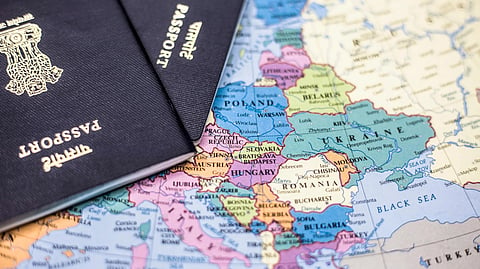
- Destinations
- Experiences
- Stay
- What's new
- Celebrating People
- Responsible Tourism
- CampaignsCampaigns
- SubscribeSubscribe
- Buy Now

In a move that merges diplomacy, accessibility, and security reform, India has announced sweeping changes to its cross-border travel regulations for citizens of Nepal and Bhutan. The Ministry of Home Affairs (MHA) directive, which came into effect on September 2, 2025, aims to simplify entry while introducing a modernised immigration framework to address wider challenges.
Citizens of Nepal and Bhutan can now enter India without passports or visas when arriving directly from their home countries—either by land or air. Instead, travellers may present a range of alternative identity documents such as: a valid Nepalese or Bhutanese passport (if available), citizenship certificate, voter ID card issued by their Election Commission, limited-validity photo ID issued by the Nepalese or Royal Bhutanese Mission in India.
For minors aged 10–18 years, a school photo ID signed by the principal is acceptable if they are traveling with parents carrying valid documents. Children below 10 years are not required to show any ID at all.
However, this relaxation applies strictly to direct entry from Nepal or Bhutan. If citizens of these countries travel via any other nation, a passport is mandatory. This measure is an extension of India’s longstanding open-border policy with its Himalayan neighbours, now formalised to make movement smoother and more transparent.
The guidelines also cover Tibetan refugees, who must hold valid registration certificates based on their time of entry. Those arriving between 1959 and May 30, 2003, under a Special Entry Permit from the Indian Embassy in Kathmandu, and individuals entering after May 30, 2003, via designated Indo-Nepal posts, remain under existing regulations.
Alongside the relaxation, the government has enforced stricter oversight under the Immigration and Foreigners Act, 2025, effective from September 1, 2025. This law replaces older legislations like the Passport (Entry into India) Rules, 1950, and the Foreigners Order, 1948, creating a consolidated immigration framework.
In Uttar Pradesh’s border districts, the Bureau of Immigration (BOI) has been empowered to investigate immigration frauds, deport illegal migrants, and manage a centralised database. All foreign nationals, including those from Nepal, and Overseas Citizens of India (OCIs) must submit Form C, while institutions like hotels, hospitals, and universities are required to report foreign guests or students. Non-compliance could invite fines up to INR 3 lakh or three years in jail. OCIs are further required to file Form S, with local civil authorities designated as Foreigners Registration Officers (FROs) to enforce the rules.
In a humanitarian gesture, the directive also exempts persecuted minorities from Afghanistan, Bangladesh, and Pakistan (including Hindus, Sikhs, Buddhists, Jains, Parsis, and Christians) who entered India on or before December 31, 2024, from the requirement of holding valid passports or visas. Registered Sri Lankan Tamils who arrived by January 9, 2015, have also been granted similar relief. These measures ensure legal protection and oversight for vulnerable groups while upholding India’s long-standing role as a safe haven.
1. Do Nepalese and Bhutanese citizens need a passport or visa to enter India now?
No. As per the new rules (effective September 2, 2025), citizens of Nepal and Bhutan can enter India without passports or visas if traveling directly from their countries.
2. What ID documents can Nepalese and Bhutanese citizens carry while entering India?
They may use a citizenship certificate, voter ID, passport (if available), or an ID issued by their mission in India. For minors (10–18 years), a school ID signed by the principal is valid; children under 10 need no ID.
3. Can Nepalese and Bhutanese citizens enter India via another country without a passport?
No. If travelling via any third country, a valid passport is mandatory for entry into India.
4. What is the Immigration and Foreigners Act, 2025?
It is a new law that replaces older rules and strengthens India’s immigration system. It mandates documentation like Form C for foreign nationals and imposes penalties of up to INR 3 lakh or three years’ jail for non-compliance.
5. Who else benefits from the new entry directives besides Nepal and Bhutan?
The rules also exempt persecuted minorities from Afghanistan, Bangladesh, and Pakistan (Hindus, Sikhs, Buddhists, Jains, Parsis, Christians) who arrived before December 31, 2024, and registered Sri Lankan Tamils who arrived before January 9, 2015.
